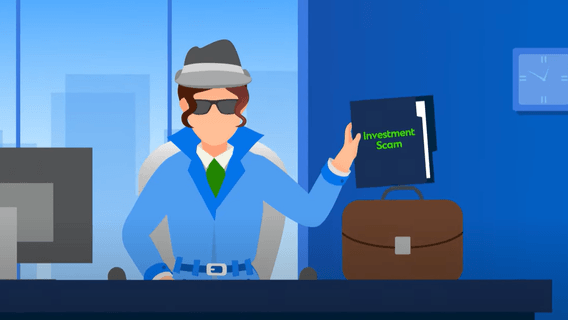-

Too good to be true?
Spotting investment scams before it’s too late.
In today’s fast-paced digital world, it’s easier than ever to invest your money – and unfortunately, just as easy to get scammed. With slick websites, fake trading apps, and scammers pretending to be from trusted financial institutions, these fraudulent investments can look incredibly convincing.
At Standard Chartered, your financial safety is our top priority. That’s why we want to help you understand how these scams work, how to spot the warning signs, and what to do if something doesn’t feel right.

So, how do these scams actually work?
It usually starts with a friendly message, or a convincing looking advertisement. Maybe someone reaches out to you on social media or messaging apps, or you come across an ‘amazing investment opportunity’ on social media. They might say they’re a professional trader or claim to be an employee of a big name bank.
The returns they offer? Unbelievable…and that’s exactly the problem.
You might see fake profits on a dashboard, or even be able to see real-time stock price movements in an app. It builds trust. But once you’ve put in more money, things change. Suddenly, your account is locked. You can’t withdraw your funds. And the person who was so responsive before? Gone.

5 red flags that scream “investment scam”
- Too-good-to-be-true returns- Promises of doubling your money in a few weeks or claims of 10x returns in months? That’s not investing. It’s a trap.
- Fake connections to big names – Scammers often pretend to work with well-known banks (such as Standard Chartered), or even create entirely fake organisations to sound legitimate.
- Institutional accounts for everyday investors – Be wary of anyone offering you access to exclusive or high-net-worth-only trading accounts, or investment groups with capped membership numbers. These aren’t available to the general public.
- Dodgy apps and trading platforms – Many scams use fake platforms that show fake profits. They may look real, but they’re not connected to any actual stock exchange. Don’t trust an app just because it’s available on popular app stores.
- Small wins, then silence – Sometimes, you’ll be allowed to withdraw a small amount of money early on to build trust, which encourages you to invest more. Occasionally, the scammers might also try to charge you a processing fee and convince you to part with even more money in order to make a withdrawal.

What if you’ve already invested?
First of all, don’t panic – and definitely don’t send any more money. Here’s what to do:
- Stop all contact with the scammers immediately.
- If you’ve invested in a scheme that claims to be affiliated with Standard Chartered, contact us as soon as possible using trusted contact details found on the back of your bank card, or our official website.
- Report it to the authorities, such as your local police or national cyber-crime unit.
- Keep all evidence. Messages, transaction details and screenshots of investment groups / advertisements can all help in an investigation.
- Tell someone. Whether it’s a friend, a family member, or us, talking about it can help protect others.

How to avoid falling victim to an investment scam
- Take your time – never rush into an investment. Ask questions and be cautious if the answers you receive are vague or avoidant.
- Check the credentials – you can’t always trust contact details in advertisements, social media posts or even apps. Visit the company’s official website for further details on an investment or to get contact details so you can make an enquiry.
- 100% certainty – if you have even the slightest suspicion something is off, it probably is. Get a second (and third) opinion from people you trust, and step away from investment opportunities unless you’re absolutely certain it’s legit.
- Never give away personal or confidential information, such as your bank account number, ID details, passwords, or card numbers.
We’re here to help
For anything urgent or to report a suspected fraudulent transaction, call us immediately using the number on the back of your bank card.
If you’re unsure about an investment opportunity you’ve seen or think you might have been targeted in a scam, get in touch with us.